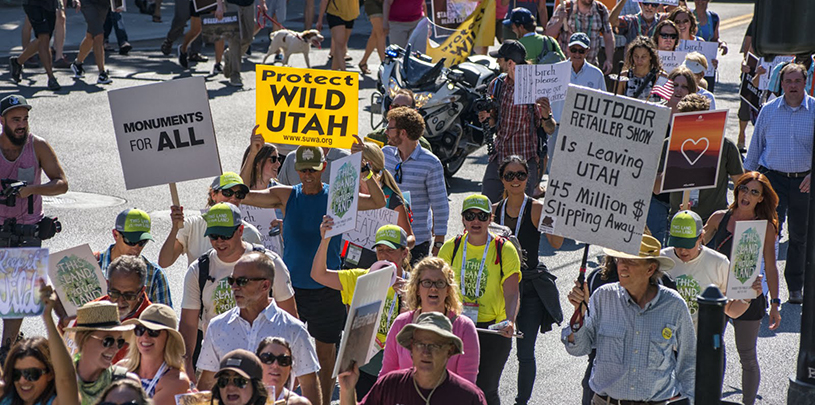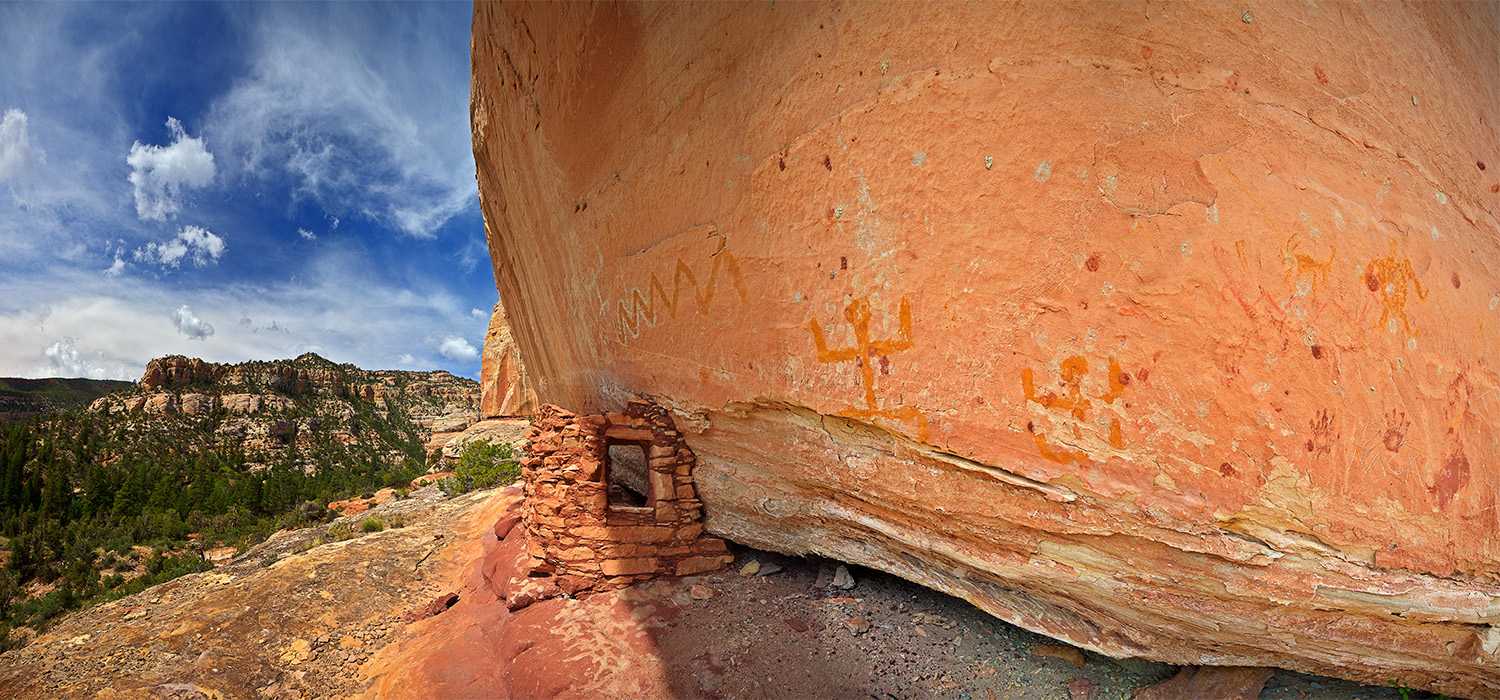
 by Tim Peterson, Utah Wildlands Director
by Tim Peterson, Utah Wildlands Director
Last week, Salt Lake City witnessed the last Outdoor Retailer trade show to be held in Utah. The state’s largest convention was responsible for $45 million in annual spending in the capital city. For 22 years, outdoor gear manufacturers, celebrity athletes, and retail buyers have come together in Utah twice a year not only to do business, but also to debate and advance the issues of the day relevant to their industry. Where, without public lands, would their customers have a place to use all that gear? Healthy, protected outdoor spaces provide the infrastructure for their industry, and that means public lands.
In the face of continued hostility toward public lands from Utah political leaders, particularly toward Bears Ears and Grand Staircase-Escalante national monuments, the hosts of the show (the Outdoor Industry Association, or OIA, and their member companies) carried through on a promise to leave the state when Governor Gary Herbert refused to hear their plea to back off on policies that are openly hostile to public lands and national monuments.
The state’s stance could prevent two other outdoor shows from relocating to Salt Lake City. OIA has announced that they will stage their upcoming conventions in Denver, Colorado, which, unlike Utah, has worked to recognize the economic importance of protected public lands to businesses’ bottom line.
Outdoor business is not trivial — according to OIA, nationally it accounts for 7.6 million direct jobs, $887 billion in consumer spending, $268 billion in federal tax revenue, and $59.2 billion in state and local tax revenue annually. This impact is more than double the oil and gas industry. In Utah alone, outdoor recreation is responsible for 110,000 direct jobs and $12.3 billion in spending annually, not including the impact of the lost trade shows.
Having personally attended these trade shows for nearly a decade, this last show in Utah was something to behold. Years ago, it was tough to get companies interested in defending public lands. Patagonia and Black Diamond were always conservation stalwarts, but many others waved off non-profits like ours asking for donations, time, or advocacy. But over time, companies began to notice the brand loyalty Patagonia has developed through its commitment to the environment. Now, more and more companies are taking a stand, and the outdoor industry is speaking with one voice — one that values, respects, and defends the outdoors.
This year the OIA Industry Breakfast, usually a small event where retailers talk trade tariffs, marketing, and gear trends, was held in a large ballroom packed beyond capacity. Attendees spilled into the hall to hear former Interior Secretary Sally Jewell’s first public speech since leaving office in January. She delivered. Speaking about the ongoing “review” of 27 national monuments for appropriateness and size, she said:
President Trump is putting himself on the wrong side of history. If he acts to revoke national monuments, he will go down as one of the most anti-conservation presidents in the history of this nation…If he wants to conduct a review, it should be about what other places are deserving of monument status, how we can better support our public lands with smarter budgets, how we can boost our public/private partnerships engaging people like you, how we can engage more young people in the great outdoors, how we can tackle climate change. That's what he should be spending his time on.
The next afternoon, 3,000 show attendees staged a march from the convention center to the state capitol. The tone was respectful, honoring and thanking Salt Lake City for two decades of hospitality, but also firm, holding Utah politicians accountable for their unpopular and hostile stances on public lands issues. At the rally, Ute Indian Tribe Business Committee Member and Bears Ears Commissioner Shaun Chapoose said:
As a Utah resident since forever, and a Colorado resident since forever, I think we all value public lands more than people realize…Most of this land which you talk about was once ours. It was taken, and we weren’t involved. And now here you sit with your public lands - an attempt to take it, without your involvement. What I hope you learn and what we try to teach you is, you need to speak up. You need to stand for what you believe…I will let you know the Ute Indian Tribe will always defend the rights and sovereignty of Native American Tribes, and that's why we stand with Bears Ears and we stand to protect any public lands within the State of Utah.”
The public lands issue still causes cognitive dissonance with some Utah officials. Governor Gary Herbert said during his monthly news conference: “While we tried mightily to find a win-win, what we ended up with is a lose-lose. I think this has been more about political rhetoric and politics, and less about substance and about good policy.” He then pivoted away from what had been an open debate about support for national monuments with OIA.
We hope Utah voters at large see the situation differently, and we hope they will remember the intransigence of their elected officials come election day, and send a message that protecting public lands is not only popular, it means business!

Cultural landscapes are full of stories, artifacts, and resources to appreciate. Here's how ›
Utah voters strongly support national monuments in general, and Bears Ears and Grand Staircase-Escalante in particular, a new poll shows.
Read MoreA small victory in the legal case challenging Daneros uranium mine, near Bears Ears National Monument.
Read MoreBears Ears petroglyph panels and cultural sites protected by new proposed management plan.
Read More